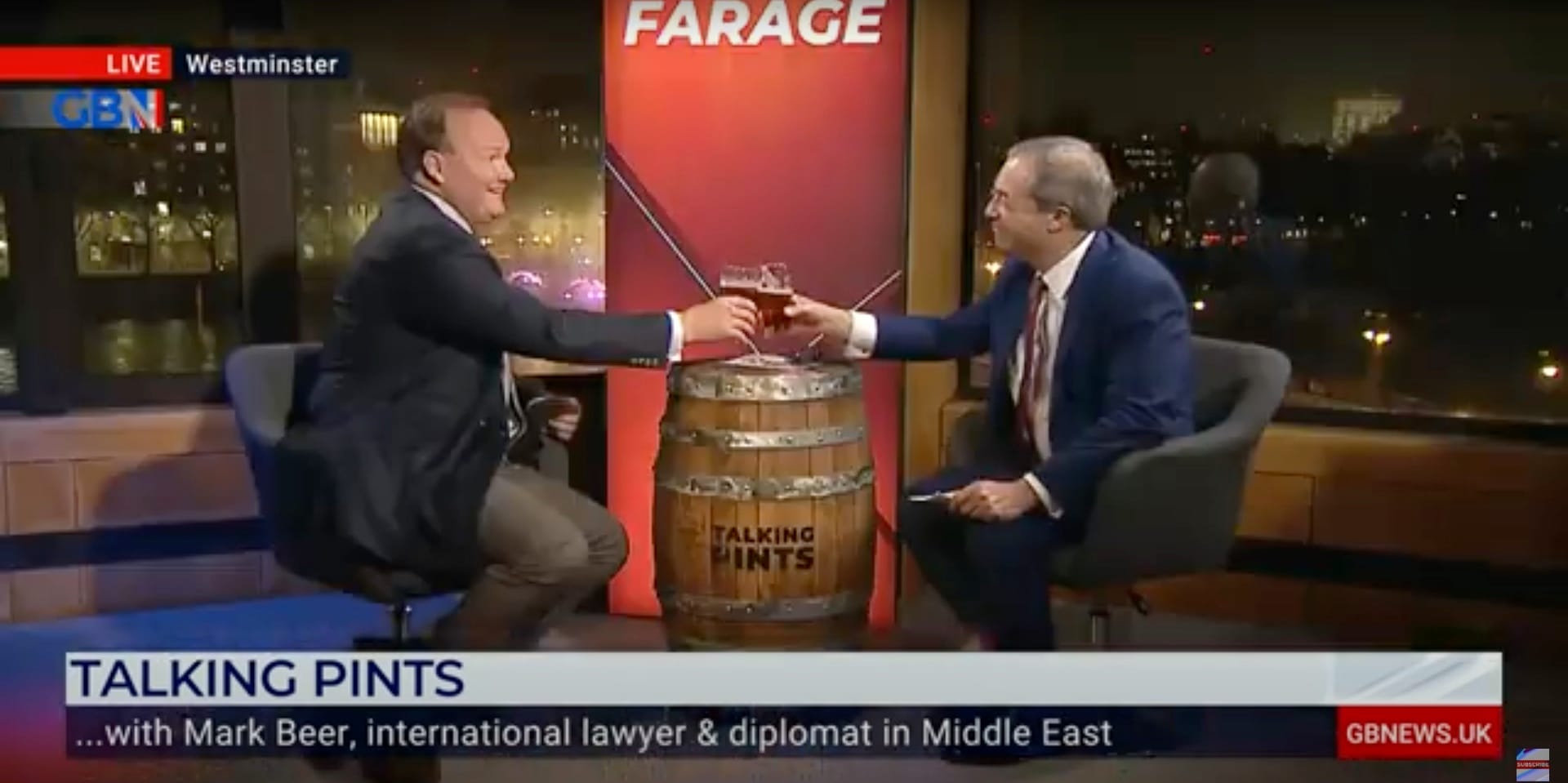How well will Reform UK do in Oxfordshire?
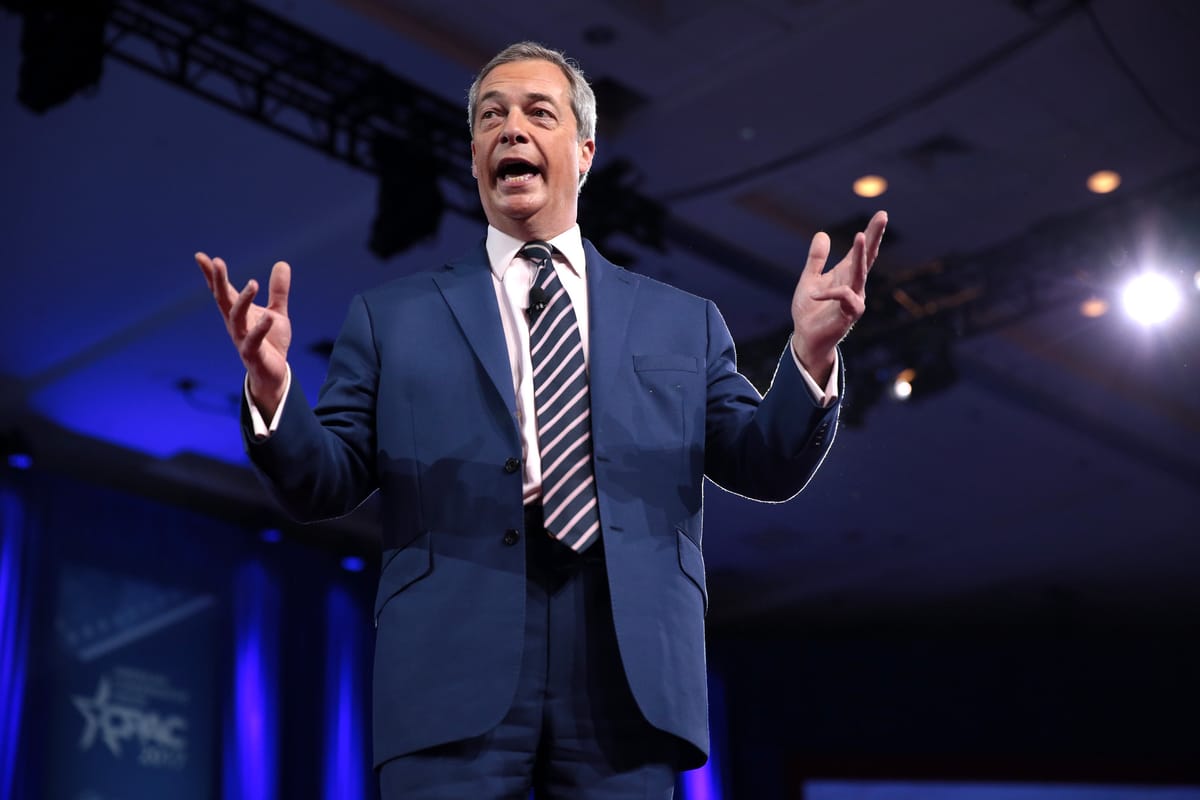
We have, honestly, no idea.
We realise that you come to the Clarion for greater political insight than “sorry, dunno”. But these are strange times. Let us lay out exactly why we have no idea.
Have you been door-knocked by a Reform UK canvasser? Neither have we. But we have, like many Oxfordshire residents, received a Reform UK leaflet through the post, headed by a stern-looking Nigel Farage.
Do you know what Reform UK’s policies are for Oxfordshire? Neither do we. In the leaflet, Nigel asserts that “Your bins are not being collected frequently enough, potholes are not repaired, they pay themselves huge salaries, yet they keep raising your council tax.” We found a Reform UK leaflet for Cambridgeshire. Here, Nigel claims that “Your bins are not being collected frequently enough, potholes are not repaired, they pay themselves huge salaries, yet they keep raising your council tax.” And one for Shropshire. “Your bins are not being collected frequently enough.” Devon. “Potholes are not repaired.” You get the idea.
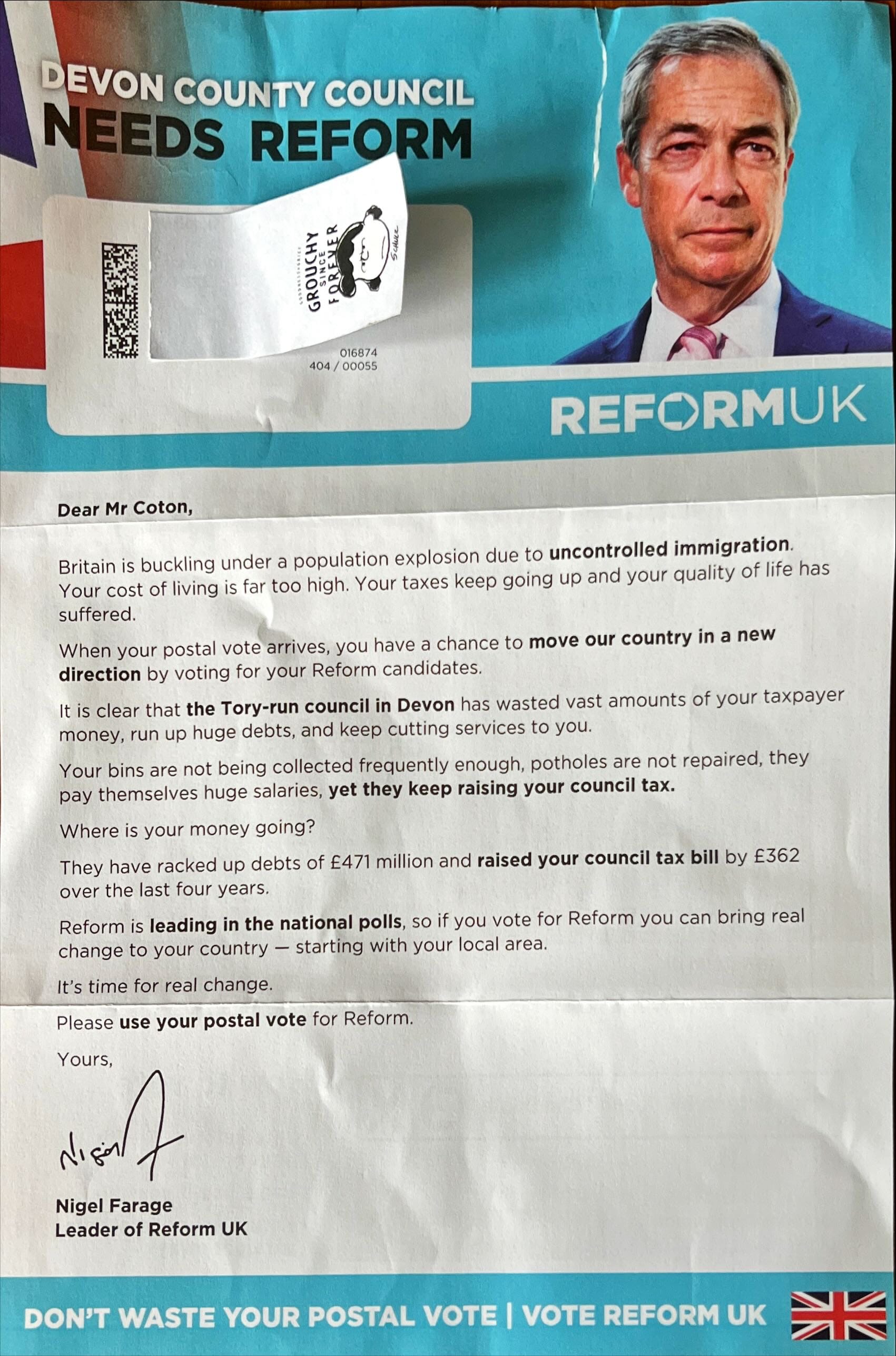
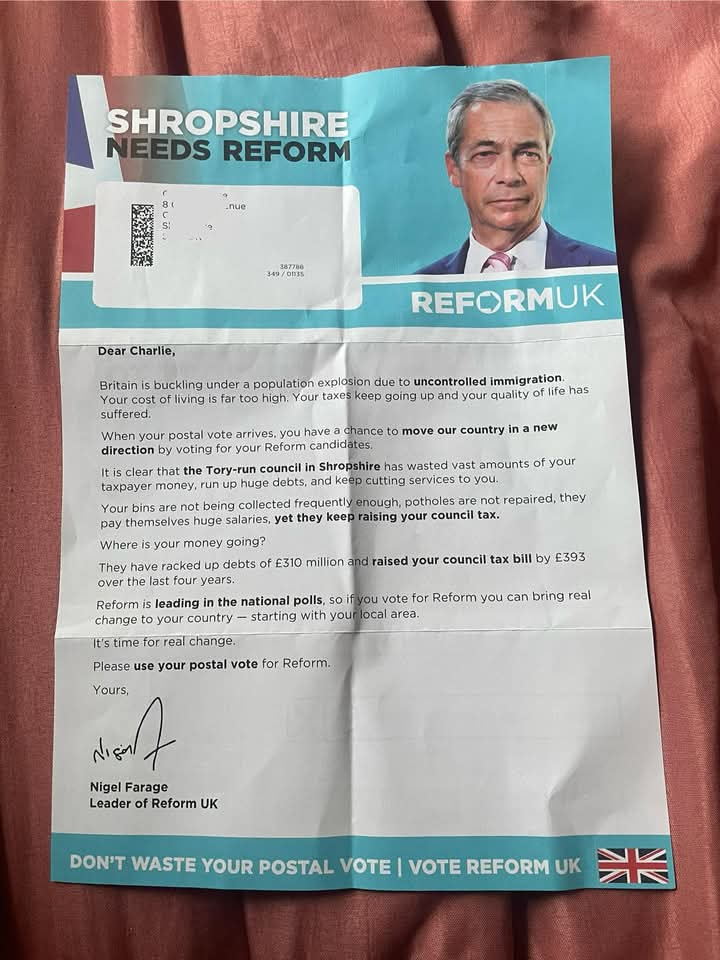
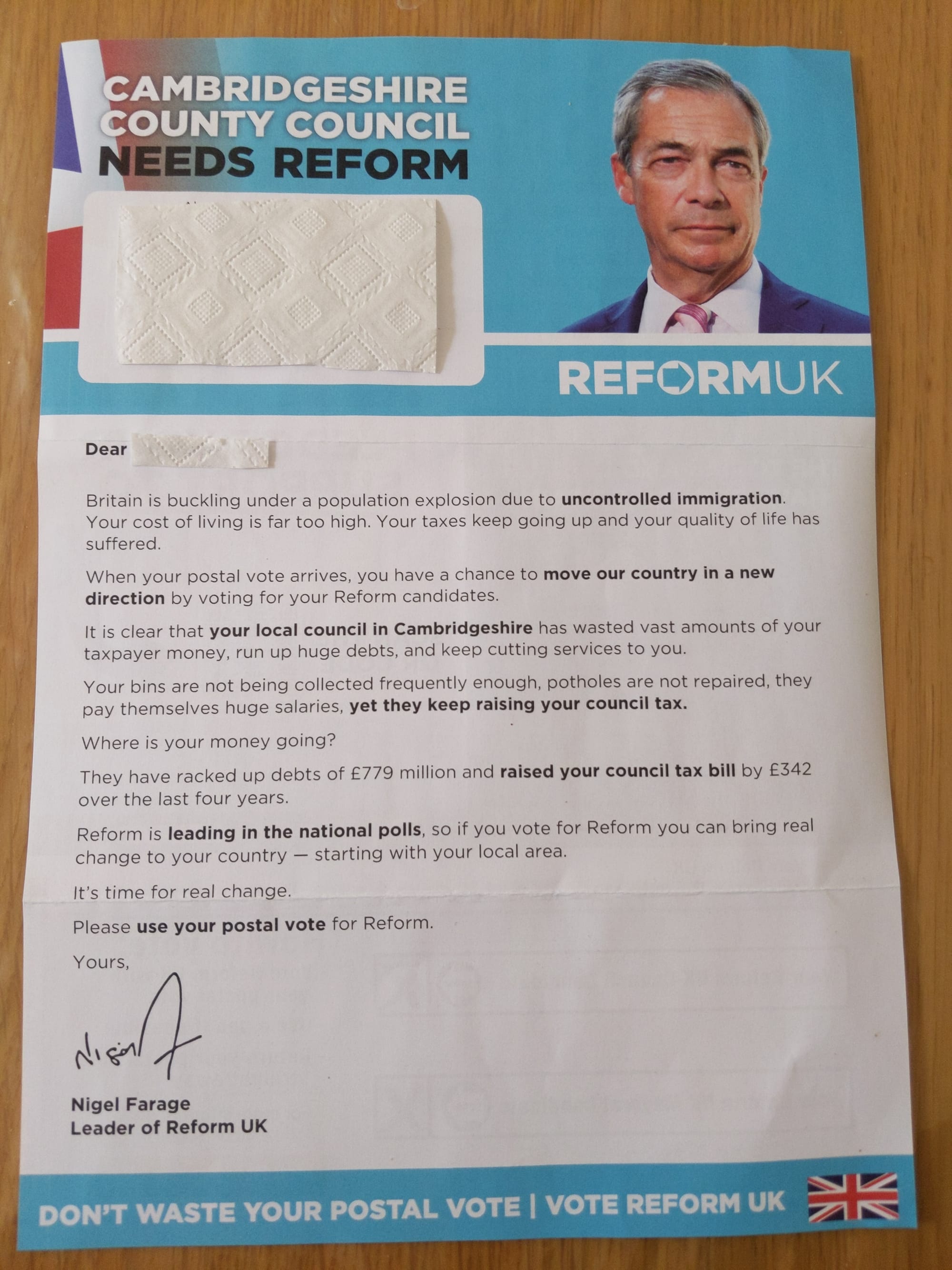
Dare we admit we're quite happy with the frequency of our bin collections? Images from electionleaflets.org.
Does that matter? Apparently not. Activists from the traditional parties have told us they are finding a lot of Reform support on their rounds. We’re also seeing an uptick in ‘organic’ (unpaid) social media support for Reform locally. Effectively, Reform are fighting this local election as if it’s a national election. “Freeze immigration and stop the boats” is not something Oxfordshire County Council can do much about, short of stationing gunships on the Oxford Canal in Cropredy. OCC doesn’t even control the bins (that’s district/city council). No matter. Farage’s message is simple: if you’re fed up with the Government, vote Reform on Thursday.
Who will they take votes from? Historically it’s been the Conservatives. But national Labour’s messaging on asylum, immigration, trans rights, and fuel duty suggests they are nervous of the Reform threat – and the Runcorn by-election may prove this to be justified. The Liberal Democrats are a long way from Reform in terms of policy, but much of their local success has come from being the viable alternative to the Conservatives in rural Oxfordshire, and Reform could threaten that role. We are fairly confident Reform won’t take many votes from the Greens.
Will they win any seats? Don’t rule it out. UKIP came within 10 votes of winning a Witney council seat in 2013, at a time when the party was at 15% in the national polls. Right now, Reform is sitting at around 25% nationally.
Will they have any other effect? This is where our heads start spinning. The effect on a rural Con/LibDem battleground is easy(-ish) to call; it makes life harder for the Conservatives and easier for the LibDems. Seats in Banbury could become three-way marginals, Conservative vs Labour vs Reform. But Oxford is really complicated. Take Headington & Quarry as an example, currently LibDem-held, but facing strong challenges from Labour and an Independent. Who, of those, will Reform take most votes from?
Where will they do best? Banbury had a strong UKIP vote, topping 25% in the 2013 OCC elections. Its Midlands-adjacent demographic is perhaps the most naturally sympathetic to Reform, though the suspension of their candidate Stephen Hartley in Banbury Hardwick hasn’t helped. Didcot appears to have the most active Reform campaigners and is one to watch. Berinsfield, Benson and Carterton could be fertile territory. Several rural seats also topped 20% for UKIP in 2013, from Goring to Ploughley; Reform UK’s two incumbent councillors (Felix Bloomfield and Kevin Bulmer, both ex-Conservative) obviously think there are opportunities here and have chosen to stand in Drayton and Wallingford. And then there’s the great unknown of Oxford city…
Who would they work with? Conservative–Reform alliances have been much rumoured by newspaper commentators but could be vetoed by either party’s leadership. The “motorists’ rights” agenda dovetails with the Independent Oxford Alliance, and IOA candidate Mark Beer has already enjoyed a friendly chat with Nigel Farage on his GB News show. Still, alliances are for after election day. Right now, the parties are competing for votes – and the result is anyone’s guess.
Why are you telling us this? We suspect the Venn diagram crossover of Clarion readers and Reform UK voters is relatively small. But Reform’s strategy of playing national politics on the local stage shows the importance of going out and voting. Your favoured local party, of whatever stripe, will be looking for help on Thursday: if you feel strongly, email them and ask to volunteer. Then, on Friday, we’ll be posting the results live on our Bluesky account. Expect surprises.
